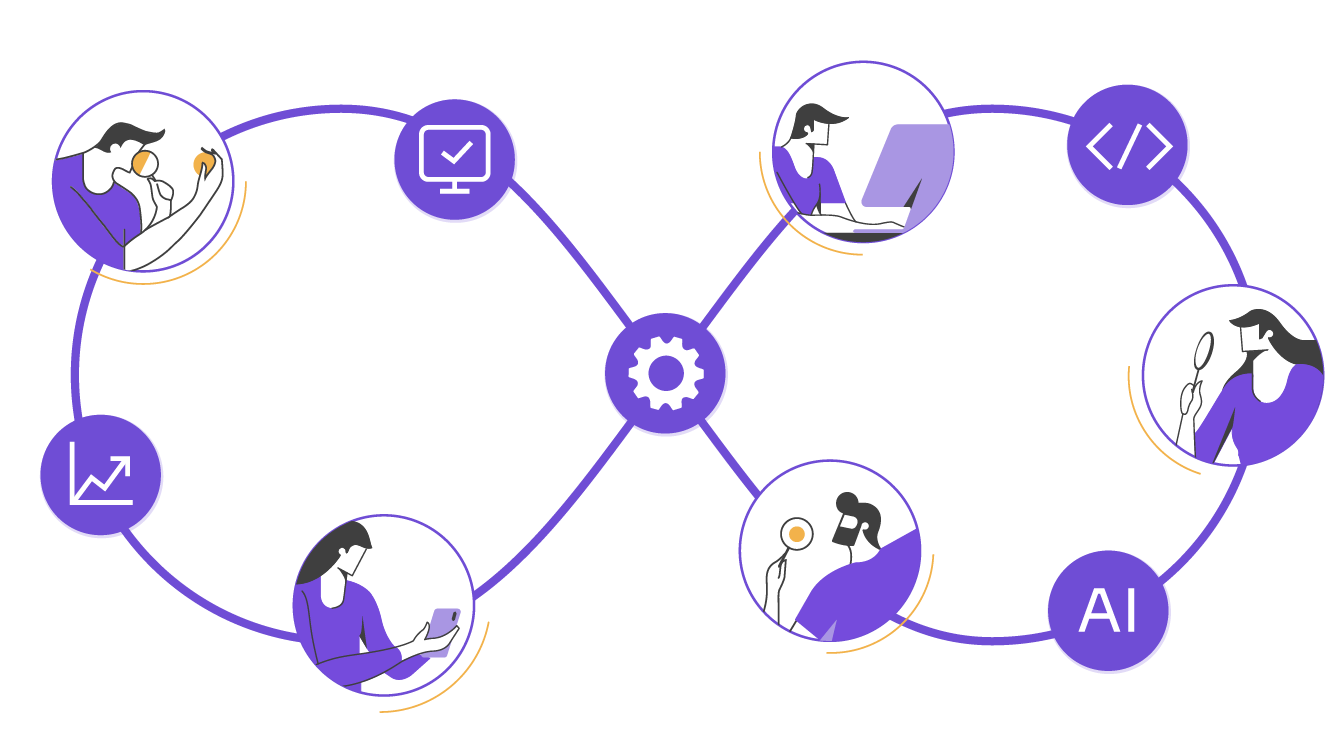Leverage AI to solve real-world business challenges, improve decision making, and accelerate business growth—without falling for inflated promises. Learn from real world case studies, and dive into a proven approach to developing scalable AI solutions, hand in hand with Sofia Palamarchuk, Co-CEO at Abstracta.


Why AI for business leaders is a strategic priority? AI is no longer only a technical trend relegated to the R&D lab or data team. Business leaders across every industry are being asked how they plan to use artificial intelligence to enhance business performance, reduce costs, and create new value streams.
The urgency is real, driven by evolving markets, increasing customer expectations, and global pressure to innovate under tight constraints.But the pressure to “do something with AI” can be paralyzing. Leaders often find themselves inundated with vendor pitches, internal experimentation requests, or reports from analysts like Gartner projecting enormous gains from AI adoption.
These projections are tempting, but also dangerous if taken at face value. What’s often missing from these visions is the context of real world scenarios: limited technical capacity, fragmented operations, unclear data governance, and organizational inertia.
To navigate this landscape, business leaders must move beyond vague innovation goals and toward AI strategy rooted in practical applications, measurable outcomes, and a clear understanding of where the organization stands.
From Automation to Intelligent Action
Using AI tools, but still chasing real outcomes? Go beyond coding and get to know our AI Agent Development Services. Book a meeting
AI as a Core Driver of Business Growth


Artificial intelligence has the capability to transform how organizations think, operate, and adapt. When used strategically, AI enables leaders to uncover hidden patterns in their data, automate previously manual decision-making processes, and respond faster to emerging market trends. This drives both operational efficiency and a cultural shift toward continuous learning and innovation.
Yet even with such potential, AI must be approached as a journey, not a silver bullet. The maturity required to implement, measure, and scale AI does not emerge overnight. It requires a deliberate, phased approach that builds confidence, capability, and commitment across the entire organization.
The Pitfall of Expectations: When Gartner’s Promise Doesn’t Match Reality
Many organizations turn to established industry benchmarks and analyst projections to shape their expectations. Reports from Gartner and other leading research firms often set the tone for investment decisions, quoting figures like 30% increases in productivity or cost savings of millions through automation.
These numbers are based on aggregated data, best-case scenarios, and long-term potential. But for many business leaders, the reality of implementing AI on the ground tells a different story. For instance, according to Digit, a recent Gartner survey revealed that only 37% of teams using traditional AI and 34% of those using GenAI reported high productivity improvements. That means 63–66% of organizations saw low gains.
This underscores how widespread the gap is between analyst forecasts and business realities. At Abstracta, we’ve worked with companies that adopted generative AI tools across business units expecting radical transformation, only to encounter resistance, confusion, or outright stagnation.
In one case, a financial institution spent six months training teams to use AI-powered documentation summarizers. Usage peaked in the first week, then dropped off completely. Why? The tool was powerful, but it didn’t integrate with the team’s actual workflows. There was no alignment with their operational goals, no accountability for adoption, and no clear definition of success. The result: frustration, wasted effort, and renewed skepticism toward innovation.
These experiences are more common than many care to admit. AI doesn’t fail because it’s overhyped but because organizations cannot change how they work at once. Without the right structure, leadership support, and cultural foundation, even the best AI technologies become shelfware.
To move forward, business leaders must shift the conversation away from general promises and toward specific, actionable questions:
- What real world business challenges are we solving with this technology?
- Where are the bottlenecks in our operations that AI could address today?
- How do we measure success in terms of business performance?
This grounded approach helps reset expectations and lays the foundation for strategic implementation that can actually deliver on the potential of artificial intelligence.
A Practical AI Strategy for Business Leaders


Designing a successful AI strategy starts with business intent. AI must be treated not as a technical upgrade, but as a strategic capability tightly woven into the company’s long-term goals.
Anchor AI to Business Strategy
The most common mistake we see is launching AI initiatives without connecting them to specific outcomes.
Ask yourself:
- What are the core challenges AI could help us address today?
- What processes demand high effort but deliver low differentiation?
- How will we know if AI is actually delivering value?
AI becomes powerful when it supports the goals that already matter to your teams, reducing cycle times, improving service quality, strengthening compliance, or enhancing customer experiences.
Example: In a client project, we helped integrate natural language processing into the support workflow—not to replace humans, but to summarize issue trends weekly. This informed product decisions and reduced average response times by 22%.
Start Small, Think Big
You don’t need to redesign your organization overnight. Instead, focus on:
- Low-risk, high-impact use cases: Quick wins build trust and generate momentum.
- Process-centric thinking: Don’t chase trends—optimize what’s already critical.
- Scalability: Design each step so it can evolve and connect with others.
Many successful projects begin in testing or documentation and then grow into broader areas like project management or operations.
Share Ownership Across Roles
AI is not just for technical leaders or data science teams. Cross-functional ownership is key.
Involve:
- Product teams to define what “valuable output” looks like
- Ops and QA to spot inefficiencies ripe for automation
- HR and leadership to support culture change
When adoption is owned collectively, it becomes embedded. Otherwise, it stays in a lab.
No Coding Experience? No Problem
Modern AI tools don’t require deep technical expertise. What they do require is clarity, curiosity, and alignment.
At Abstracta, we guide business leaders, with or without technical backgrounds, through the design of AI agents using platforms like our Abstracta Intelligence Hub. You choose your use case, define goals, and we help you configure agents that work within your context.
This empowers teams to:
- Deploy AI faster
- Avoid the learning curve of raw tooling
- Integrate with their current stack
Build the Right Foundations
Before scaling, assess:
- Do we have clean, accessible data?
- Are our processes well defined?
- Is there a clear owner for each initiative?
- How are we measuring performance?
This foundation allows you to move beyond experimentation and into production-ready adoption.
The Human Dimension of AI Adoption


To explore what it really takes to integrate AI into daily work, we spoke with Vera Babat, Chief Culture Officer at Abstracta and the leader of our AI Enablement team. Her perspective brings clarity to what often gets missed in AI conversations: that adoption is not just technical, it’s emotional, cultural, and deeply human.
“One of the biggest mistakes when implementing AI tools is assuming that a demo is enough. That a presentation and an instruction manual will do,” stated Vera.
This shift—what she calls expanded intelligence—requires individuals and teams to reimagine their roles, their routines, and the value they bring.
“Adopting AI in our daily work requires undergoing a paradigm shift, where intelligence is no longer just human but expanded, enhanced through Artificial Intelligence. And that changes everything.”
For this transformation to be sustainable, Vera emphasized the importance of spaces that go beyond technical training: reflection, experimentation, and shared learning. That’s why at Abstracta, we created a dedicated AI Enablement team to support our own team and others in how to embrace it meaningfully at a pace that respects their reality.
Because, as Vera reminds us, technology alone doesn’t transform organizations. People do—when they’re supported, involved, and given the space to grow with it.
From Generative AI to Computer Vision: Expanding What’s Possible


Once the human and cultural foundations are in place, the next step is to explore how AI can be applied in real workflows—intentionally and at scale. The question shifts from “should we adopt AI?” to “where will it create the most value?”
At Abstracta, we work with teams to identify the highest-impact opportunities, focusing on use cases that enhance—not replace—human contributions. From writing test cases to prioritizing incidents, our AI agents are designed to reduce friction, not remove thinking.
Here’s how some of the most powerful AI technologies come into play across real-world scenarios:
Generative AI: From Blank Page to Structured Output
Generative AI is one of the most visible breakthroughs, but its true value emerges when it’s guided by context and purpose.
We help teams use generative agents to:
- Draft user stories from technical documentation
- Translate test plans into BDD formats
- Write internal FAQs or change logs with consistent tone and structure
Natural Language Processing: Understanding at Scale
Many organizations sit on thousands of unstructured text sources, support tickets, internal docs, and customer feedback. Natural language processing helps surface meaning from this noise.
Applications include:
- Summarizing bug reports to identify recurring root causes
- Grouping customer complaints by theme and urgency
- Extracting key requirements from legacy specs
Computer Vision: When the Input Isn’t Text
In industries like fintech, healthcare, and logistics, valuable data often comes in visual formats: screenshots, scanned forms, and photos.
Using computer vision, our AI agents can:
- Detect differences between test environments
- Read and process scanned documents for validation flows
- Support accessibility audits by highlighting layout inconsistencies
Deep Learning and Pattern Recognition
Beyond reactive use cases, deep learning enables more predictive, adaptive systems. From anomaly detection in performance metrics to prioritization of test suites based on historical flakiness, it allows your tools to get smarter over time.
Combined with internal business logic, deep learning models can prioritize issues by risk, not just volume, helping teams work more strategically.
Our Strategic AI Enablement Program
The real power of AI doesn’t lie in a single use case. It emerges when multiple agents, each built with a clear objective, connect across tools and teams, forming an ecosystem that grows with the organization.
That’s how AI moves from a single experiment to a sustainable advantage. Not by replacing humans, but by allowing them to focus on what matters most: critical thinking, collaboration, and creativity.
Bringing AI into your organization means developing a new organizational capability. That’s why we created a structured program to support leaders and teams from the first opportunity mapping session to the full integration of AI agents into daily workflows. Our approach combines strategic planning, technical development, and human enablement.
From using Abstracta Intelligence Hub, a secure platform to design and share AI agents, to custom agent development and full AI adoption support, we help you integrate AI into real work, at scale.
Book a meeting.
FAQs about AI for Business Leaders


What Is AI for Business Leaders?
AI for business leaders is the strategic use of artificial intelligence to drive performance, unlock new opportunities, and address real world business challenges.
What Is a Good AI Strategy?
A good AI strategy aligns with business goals. It starts small, builds internal capability, and delivers strategic insights across departments.
Can I Implement AI Without Technical Expertise or Prior Knowledge?
Yes. With the right tools, business leaders can apply AI effectively without coding experience or prior knowledge of data science or machine learning.
What Is the Abstracta Intelligence Hub?
The Abstracta Intelligence Hub is a secure platform to create, manage, and scale AI agents that integrate with tools used across business functions.
How Does AI Play a Transformative Role in Digital Transformation?
AI plays a transformative role by changing how organizations operate. It supports digital transformation through automation, intelligent workflows, and real-time adaptation.
How Can AI Enhance Decision Making With Big Data?
AI enhances decision-making by extracting insights from big data. It helps leaders act faster, reduce risks, and prioritize based on evidence.
What Are Large Language Models Used For?
Large language models automate text-related tasks like summarizing documents or writing test cases. They improve productivity across business units.
What Is the AI Industry Focused On Today?
The AI industry is focused on generative AI, emerging technologies, and scalable applications that create competitive advantage for modern organizations.
Who Are AI Leaders and Industry Experts?
AI leaders and industry experts are professionals who guide AI adoption. They translate business needs into actions and drive cultural change.
What Is a Comprehensive Program for AI Adoption?
A comprehensive program includes diagnosis, training, implementation, and governance. It combines technology, human resources, and change management. Schedule your consultation for more info.
How We Can Help You


With over 17 years of experience and a global presence, Abstracta is a leading technology solutions company with offices in the United States, Chile, Colombia, and Uruguay. We specialize in software development, AI-driven innovations & copilots, and end-to-end software testing services.
We believe that actively bonding ties propels us further and helps us enhance our clients’ software. That’s why we’ve built robust partnerships with industry leaders Microsoft, Datadog, Tricentis,
Perforce BlazeMeter, Saucelabs, and PractiTest to provide the latest in cutting-edge technology.
Empower your teams with expert guidance in KPIs!
Take our software testing maturity assessment and check our solutions!


Follow us on LinkedIn & X to be part of our community!
Recommended for You
Software QA KPIs: How to Measure What Truly Matters
AI for Dummies, a Powerful Guide for All
Better Your Strategy with This Software Testing Maturity Model
Tags In


Sofía Palamarchuk, Co-CEO at Abstracta
Related Posts
Tips for Using ChatGPT Safely in Your Organization
Is resisting change worth it? At Abstracta, we believe it’s essential to prepare ourselves to make increasingly valuable contributions to our society every day and to do so securely. In this article, we share practical and actionable tips so you can harness the full potential…
Leading AI Tools for Software QA
Discover our top picks for AI tools for software QA! Dive into our comprehensive review and streamline your quality assurance processes.
Search
Contents
Categories
- Acceptance testing
- Accessibility Testing
- AI
- API Testing
- Development
- DevOps
- Fintech
- Functional Software Testing
- Healthtech
- Mobile Testing
- Observability Testing
- Partners
- Performance Testing
- Press
- Quallity Engineering
- Security Testing
- Software Quality
- Software Testing
- Test Automation
- Testing Strategy
- Testing Tools
- Work Culture





